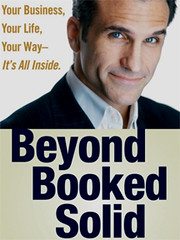His newest book, Beyond Booked Solid, was released in April. I’ve had the galley on my desk for several few weeks now, meaning to review it. But as a member of the audience the book is intended for — someone who has a decent stable of loved clients but is sometimes short on time — I had to place the review on hold.
Ah yes, irony. Or maybe not. We’ll see.
“With every new success comes new challenges and this repeated cycle is a constant state of being for the entrepreneur. Each time we solve a problem, we begin a new game at a higher level, in which are facing new problems,” reads one of the opening paragraphs.
He’s right. People, especially entrepreneurs, who are not continually facing new challenges, are not moving forward. They might not even be entrepreneurs unless they are moving forward. It’s about that simple. And simple is one of the reasons I’ve always liked Port.
You only have to watch his dismantling the concept of the elevator speech on YouTube to immediately appreciate him. Elevator speeches sometimes circumvent one’s ability to learn something about a prospect. A better solution is to apply a thinking process over the quick fix. Sure, sometimes quick fixes and systems work. It depends on who you are and what you do. And this is where it gets tricky.
On one hand, Beyond Booked Solid is the book I needed ten years ago. That’s when I faced some of the challenges it addresses the most: a small business owner who wakes up to find that they put themselves on an imbalanced life treadmill, never thinking for a moment that there were other options (even though I had already been there before).
For the most part, it’s the by-product of someone who sells service. Sooner or later, there are not enough hours to sell, even with new staff and outsourcing.
This is where Port’s book works best. His book helps service professionals come to the conclusion that at the end of the day —whether they are a doctor, attorney, instructor, or other service provider — there are more options than simply filling every hour of every day, especially if it throws your life-work balance out of whack. What always seems to work better is saving some time to invest in building a better business model, the one that allows you more resources not less resources at the end of the day.
Port even tackles the excuses that might be standing in your way.
• My system is too complicated for me to explain to other people or write it down.
• I couldn’t trust anyone else to do it better than I do.
• I’ve had systems, and they’ve been a waste of time and I don’t want to spend time fixing them or developing new systems.
Personally, I’ve always been amazed by the number of people willing to put cannot in front of something that can be done. Even last week, I felt my skin crawl when a subcontractor said “I just can’t see it” to a viable communication tool. Right on. I get it.
I don’t see how someone could land on the moon with a computer less advanced than a pocket calculator, but they did it. Part of the success was developing a system (multiple systems), possibly more complicated than many business systems, and it got the job done. Then again, there is that tricky part.
As some people know, I’m not a big fan of systems. However, every now and again, I ask myself if whether I am against systems or the abuse of systems. For example, having an elevator speech was never meant to be a scripted memorization as much as an ability to define what you do. It also only works if you can make it work for you. Port did that. And that’s what makes systems work, provided there is a thinking process behind them.
There are several standout areas in the book, but I’ll stick to highlighting two. Port walks the reader through how to document processes and then provides several personal examples of how he applies it. Second, to illustrate possibilities, he provides some solid case studies as a guide, providing business owners some flexibility. The case studies are not as engaging as those in Accidental Branding by David Vinjamuri, but they serve their purpose.
Do you want to be a franchise? Create a product line? Purchase and rebrand businesses? Diversify your market presence? Etc. And because he asks the right questions, many people will find the right answers for themselves.
Of course, many will not want to do any of these things because not everyone is comfortable with the idea of transforming their service into a business model, which is why not everyone is an entrepreneur. As this is the case, I’m not sure Beyond Booked Solid will appeal to as large of an audience as Book Yourself Solid did. However, it’s nice to know that someone wrote a book that reminds professionals that there are many other options.


















2 comments:
The most appealing part of the the book is the author. I had the good fortune of hosting Michael for an event, and met him on various occasions. He is what he teaches and he is a pleasure to be around.
Valeria,
You are very right, which is I am planning to contact Michael for a follow up interview. After writing the post, I had plenty of questions. I think his personality will lend even more insight into the subject matter.
Best,
Rich
Post a Comment